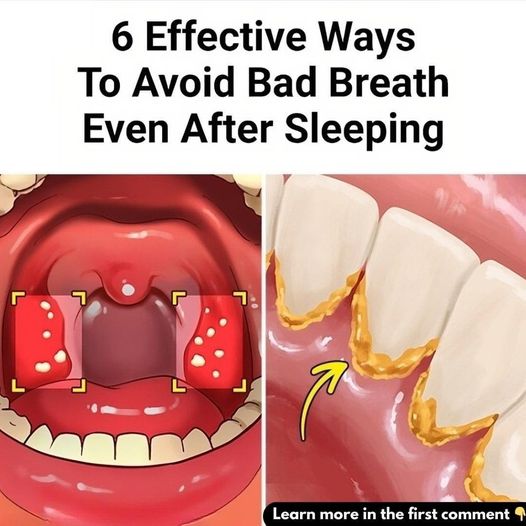Bad breath, or halitosis, can be a major confidence killer, especially when it lingers after waking up in the morning. This issue affects millions of people around the world, but the good news is that it’s entirely manageable with a few simple lifestyle changes. Whether caused by dry mouth, dietary choices, or oral hygiene habits, bad breath doesn’t have to be a part of your daily routine. By adopting some proven methods, you can wake up with fresh, clean breath and keep bad odors at bay. Let’s explore six effective strategies to prevent bad breath and boost your confidence.

The first and perhaps easiest way to tackle bad breath is to stay hydrated throughout the day. Dehydration often leads to dry mouth, which reduces saliva production—a key factor in maintaining a clean and odor-free mouth. Saliva naturally washes away food particles and bacteria that cause unpleasant smells. To combat this, drink plenty of water regularly and make it a habit to sip some before bedtime. If plain water doesn’t do the trick, chewing sugar-free gum or sucking on ice cubes can stimulate saliva production, helping to keep your mouth fresh. For those who frequently experience dry mouth despite staying hydrated, consulting a healthcare professional can help identify underlying causes and effective solutions.
Switching to sugar-free gum is another smart choice for managing bad breath. While mints may provide a quick burst of freshness, they often contain sugar, which feeds bacteria in your mouth and can exacerbate bad breath over time. In contrast, sugar-free gum freshens breath and stimulates saliva flow, which helps dislodge food particles and neutralize acids that contribute to odors. This simple swap not only keeps your breath fresher for longer but also supports better overall oral health.
Regular dental visits are crucial for preventing bad breath and maintaining oral hygiene. Even the most diligent brushing and flossing routine may not be enough to clean every nook and cranny of your mouth. Over time, plaque and tartar can accumulate, leading to gum disease—a primary cause of persistent bad breath. Scheduling routine check-ups allows dental professionals to remove tartar and address any emerging issues before they escalate. Investing in regular cleanings and examinations is one of the most effective ways to ensure fresh breath and a healthy smile.
A consistent oral hygiene routine is vital for keeping bad breath at bay. Before heading to bed, make it a habit to thoroughly brush your teeth with fluoride toothpaste. Brushing removes food debris and plaque that can lead to odors. Flossing is equally important, as it cleans the spaces between your teeth that a toothbrush can’t reach. Don’t forget to clean your tongue, as it can harbor bacteria responsible for unpleasant smells. Adding an alcohol-free mouthwash to your nighttime routine provides an extra layer of freshness and helps maintain a clean oral environment while you sleep.
Diet plays a significant role in the way your breath smells. Certain foods, like garlic and onions, are known to cause lingering odors, while low-carb diets can sometimes lead to bad breath due to the production of ketones, which are expelled through your breath. To minimize diet-related bad breath, consider reducing your intake of odor-causing foods and incorporating fresh, odor-neutralizing options like leafy greens, avocados, and nuts into your meals. These foods not only help neutralize unpleasant smells but also promote overall oral and nutritional health.
An often-overlooked cause of bad breath is tonsil stones. These small, hardened deposits form in the crevices of your tonsils and are made up of bacteria, food particles, and debris. While tonsil stones are usually harmless, they can produce persistent bad odors that are difficult to mask. Practicing good oral hygiene and gargling with salt water regularly can help prevent the formation of tonsil stones. If you experience recurring issues with tonsil stones, consult your dentist or doctor for advice on removal or further treatment options.
Bad breath doesn’t have to be a constant struggle. By staying hydrated, choosing sugar-free gum, visiting your dentist regularly, and maintaining a thorough oral hygiene routine, you can effectively prevent bad breath. Paying attention to your diet and addressing hidden causes like tonsil stones are additional steps that will ensure you wake up each day with fresh, clean breath. These simple lifestyle changes not only improve your oral health but also enhance your confidence, allowing you to interact and communicate without worry.
If you’ve found these tips helpful, share them with your family and friends so they too can enjoy the benefits of fresh breath and better oral health. Bad breath is entirely preventable, and by taking these steps, you can embrace each day with confidence and a brighter smile.